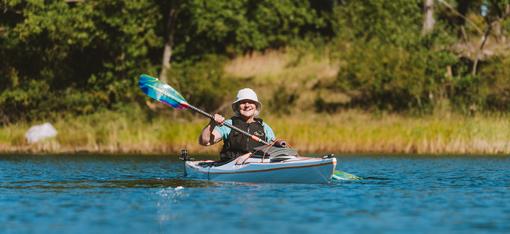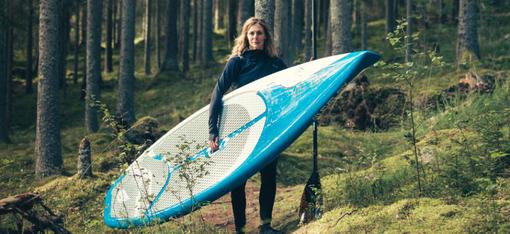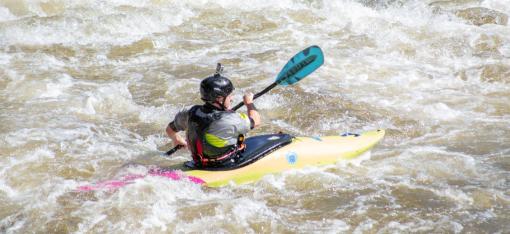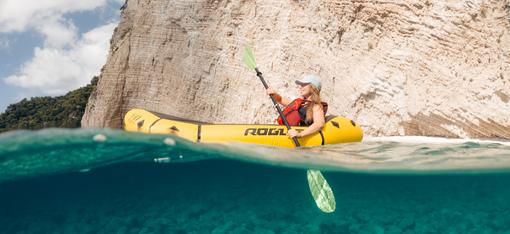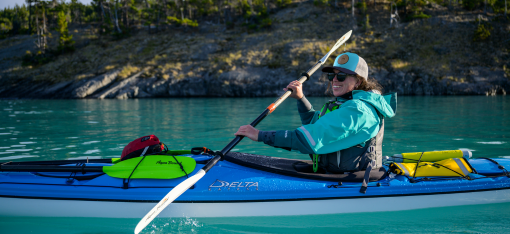Leave No Trace: Let’s Paddle Responsibly!

There are so many new paddlers out this summer due to COVID restrictions and social distancing practices. That’s great news!
But inexperienced paddlers may not know how to paddle responsibly and with Leave No Trace principles in mind. This is especially important in wilderness areas, state parks and other natural treasures we want to keep beautiful and thriving.
Let’s cover those briefly so we can all participate and enjoy our wonderful paddle sports, while also being sure everyone else can enjoy them, too.
These principles have been developed in partnership with Leave No Trace Center for Outdoor Ethics, the US Forest Service, the National Park Service, and the Bureau of Land Management.
“Leave No Trace” is self-explanatory: it means, leave no trace that you’ve been there. Many of these refer more to overnight campers than day paddle trips, but let’s review them all:
1. Plan Ahead
Impromptu can be fun and adventurous! But it often leads to thoughtlessness and carelessness that can affect both the environment we paddle and those coming after us.
When you plan, keep Leave No Trace in mind. It’ll help you decide what to pack, how much to pack, transportation and all the rest.
Are you going on a multi-day trip? Easy ways to leave no trace include using camp stoves instead of campfires for cooking, and planning for one-pot meals and light-weight snacks that have little packaging and prep time.
Click here for more.
2. Be Careful of Sensitive Surfaces When You Travel & Camp
Of course paddlers travel on the water, so that’s not an issue. But where will you launch? Where will you take out? Rock, gravel and sand are much more durable than shores with lots of vegetation.
If you’re on a multi-day trip, only camp on designated campsites on the lake or river. Or if there aren’t any, choose camping spots where you’ll cause the least disturbance.
Click here for more.
3. Know How to Dispose of Your Waste and Garbage Properly
This includes bodily waste and all that goes with it, the garbage that’ll result from food packaging and other items, and any cleaning up you’ll do, like washing dishes.
Before you head to your paddling destination, know ahead of time what’s available as far as latrines and garbage disposal. Prepare to pack everything—and we mean everything—out with you. Gallon-size Zip-locks are great for this.
Click here for more.
4. Leave What You Find Where You Found It
Don’t dig, cut, build or in other ways mess with the environment you’re in. This can be a lunch spot or a campsite. Don’t damage live trees by carving your initials into them or using nails to hang your hammock.
If you’re in a national park and most state parks, it’s illegal to pick flowers, take rocks or otherwise remove things from its natural environment.
Click here for more.

5. Think Twice before Making that Campfire
Some things to think about (and plan for) if you’ll be camping are: How will you cook your food? Is there a danger of wildfires? What’s the weather forecast? Will we camp on designated sites with a fire ring? Is there enough downed wood in the area that we won’t make an impact?
Using a camp stove to cook is faster for cooking, easier to regulate and easier to leave no trace.
Click here for more.
6. Leave the Wildlife Alone
Don’t try to feed, pet, creep up on or in other ways disturb the wildlife where you’ll paddle, especially in the wilderness.
Enjoy them, yes! Take photos if you can safely do so from a distance. But otherwise, leave them be.
Click here for more.
7. Treat Others with Respect and Consideration
Be prompt at the launches, both putting in and getting out. Don’t make others wait for you any longer than necessary. Park out of the way when loading or unloading on your vehicle. Work out of the line of traffic when inflating a boat or board.
Keep your noise volume at speaking level, especially if you’re bringing a group.
If you paddle with a dog, keep it leashed at the parking areas and launches. Don’t let it bark, chase animals or bother others. Pick up its waste.
Think about how your experience is affecting others around you, especially those not in your group.
Click here for more.
We want to all be able to enjoy the waterways around us for decades to come. And we want others to be able to enjoy them, too.
Happy paddling!
Contact our Wisconsin-based Customer Service team today to help you choose a kayak or SUP paddle: 715-755-3405 • sales@aquabound.com
More for you...

